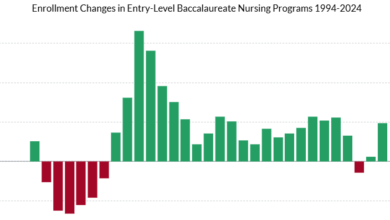Victoria Atkins replaces Steve Barclay as health secretary

Steve Barclay has been replaced as secretary of state for health and social care, as part of a cabinet reshuffle.
Prime minister Rishi Sunak today (13 November) appointed Victoria Atkins into the top role at the Department of Health and Social Care (DHSC).
“Top of the agenda is the resolution to ongoing industrial action”
Julian Hartley
Ms Atkins replaces Mr Barclay, who led DHSC from October 2022, when Mr Sunak won the Conservative leadership election. Mr Barclay has been named secretary of state for the environment.
Incoming health secretary Ms Atkins, MP for Louth and Horncastle in Lincolnshire, had served as financial secretary to the Treasury since October 2022 before her new appointment, which is considered a significant promotion.
Mr Sunak’s cabinet reshuffle was triggered by the firing of home secretary Suella Braverman, who, over the last few weeks, has repeatedly made national headlines for her inflammatory comments about homelessness and protests about the war in the Middle East.

Now-former health and social care secretary Steve Barclay
Professor Nicola Ranger, chief nurse for the Royal College of Nursing (RCN), said Ms Atkins’ first priority “must be” to secure additional funding for the NHS at the upcoming autumn statement.
“The current financial settlement is penalising patients – those on waiting lists are being told to wait even longer in a cash-strapped NHS. She can begin to address that,” said Professor Ranger.
Professor Ranger added that the NHS Long Term Workforce Plan that Ms Atkins would inherit would also need “sizeable and rapid investment to make happen”.
“Victoria Atkins will need to raise the morale of the current workforce and make urgent moves to shore up patient safety,” she said.
“There are over 40,000 nursing vacancies across the NHS in England and staff deal with staff shortages on every shift – one nurse caring for 10, 15 or more patients is a grave risk she must not accept.”
Professor Ranger referred to “intolerable pressures” for nursing staff, as well as existing issues such as low pay and staff shortages.
She added: “We expect the new health secretary to engage nursing staff in her plans and deliver long-term investment for a sustainable future.”
Acting head of health for Unison Helga Pile said Ms Atkins “has certainly got her work cut out”, and was critical of the outgoing secretary of state.
“Waiting lists and delays to treatment show no signs of abating,” said Ms Pile.
“Winter is just around the corner and that’s always a challenging time for an NHS that’s both under-funded and thousands of staff short.
“Steve Barclay couldn’t solve the many problems affecting services and patients. Improving wages across the NHS is a must, so trusts no longer struggle to hold on to experienced staff or to fill vacant posts.
“That means delivering on the commitments already agreed with unions in this year’s pay deal. And getting talks on earnings and staffing in the secretary of state’s diary at the earliest opportunity.”
Ms Pile said one of the biggest challenges for Ms Atkins would be fixing the long running “crisis in social care”.
“Once that begins to be tackled, the pressures on the NHS and its staff will start to lift,” she said.
NHS Providers chief executive Sir Julian Hartley said trust leaders would “welcome” Ms Atkins’ appointment at what he described as a “critical juncture” for health and social care.
“Top of the agenda is the resolution to ongoing industrial action,” said Sir Julian.
“The cumulative impact of strikes on patients, staff and the NHS cannot be understated. Constructive dialogue between the government and unions is key to finding a sustainable solution.
“Ahead of the autumn statement, we urge her to ensure sufficient capital investment in deteriorating NHS facilities and equipment. This is vital for the sustainability and modernisation of health services.
“Whole government action to tackle health inequalities and reforming social care are also priorities, as both are essential for the wellbeing of patients and efficiency of services.”
Sir Julian said he “looks forward” to working with Ms Atkins to address issues for the entire sector.
Also welcoming the appointment was the Royal Society for Public Health, which tweeted: “We look forward to working with the new health and social secretary Victoria Atkins MP.
“It’s essential she leads work across government to tackle health inequalities and to support the wider public health workforce.”
Steve Brine, chair of the parliamentary Health and Social Care Committee, which scrutinises policies coming out of DHSC, said of Ms Atkins’ appointment: “I welcome the appointment of Victoria Atkins to the role.
“Her appointment comes at a critical time for the NHS with the number of patients waiting for treatment at a record high.
“Preventing ill-health will be key to helping the NHS manage its resources. Prevention is one of this committee’s priorities and I hope it will be high up on the new secretary of state’s agenda too.”
Amid the reshuffle, two health ministers have announced they are stepping down.
Health minister Will Quince announced his resignation this morning, citing a desire to spend more time with his family and to “explore more opportunities”.
His resignation letter said: “Having taken the decision to stand down at the [next] general election and having recently joined the Army as a speciality reserve officer, now feels like the right time to leave HM Government.
“It has been a huge honour and privilege to have served you in the Department of Health and Social Care working to reduce the NHS Covid backlogs, recover urgent and emergency care and cement the UK as a life sciences superpower.”
Neil O’Brien, junior health minister, also announced he was stepping down.
“It’s been a privilege to serve at DHSC,” wrote Mr O’Brien on Twitter.
“Great ministerial team [and special advisers] and some fab officials.
“But with so much going on locally I want to focus 100% on constituency work so have asked to go to back benches. I’m also keen to see more of our two small children.”
Other key changes during Mr Sunak’s reshuffle have been the appointment of former prime minister David Cameron as foreign secretary, replacing James Cleverly, who himself replaces Ms Braverman.
For Mr Cameron, who is not a sitting member of parliament, to serve in the cabinet, Mr Sunak has secured him a peerage; while uncommon, members of the House of Lords may serve in the cabinet.






